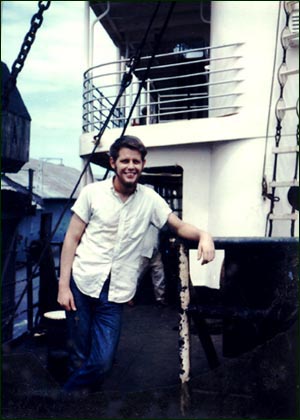The Cargo on the SS Steel Admiral
During the 1960ís, the Isthmian Steamship Company had an around the world run. The voyage usually
took close to 6 months to complete. I signed on as an AB in September '65. I had just passed my
ABís test and this was my 1st ABís job. I was 22 years old. Because I was only 22, it caused some
animosity from the older deck hands, most of whom were WWII vets. Lack of experience on my part
and they felt a senior union member should have had 1st chance at the job. Truth be known,
the job stayed on the board in the union hall for 3 job calls before I took it.
All of this matters not for I made the voyage.
The voyage for me began in Baltimore, in early September. This part of the story takes place in
December, in Indonesia, in the shadow of Krakatoa. We loaded baled latex. We entered the harbor and
dropped the anchor in the evening, before supper. There was a very large leopard shark swimming
around the ship almost as soon as the anchor went down.
Late the next morning, on the rising tide, we proceeded to the dock. The docking of the
Steel Admiral that morning and early afternoon is a story unto itself. Eventually we were
docked at a dock that was 100 feet to short for the ship. No cargo was worked the 1st day.
There was no cargo work at night.
The town was small and very poor, in a poor country, on an ill-supplied island. It is hard
for an American to imagine that kind of poor. Their currency had just been devalued by a factor of
ten. Ten rupiahs became one rupiah. This did affect the value of the dollar. It was better than gold.
There was one electric light in the town. Coleman lanterns lit the houses as we walked thru the
town, on the one hard surface street, looking for a cold one. No electricity meant no refrigeration.
There was warm beer however, at only 10 cents a bottle. They were quart bottles with wooden
plugs for caps. It didnít taste like any beer I had ever had. I passed on it. Some of the guys
drank lots of it. Most of the young fellows ended up at an outdoor place drinking orange
soda.
Cargo operations started the next morning. Baled latex is a raw latex sheet, 3 feet wide,
folded back on itself until it is a cube 3x3x3. Then it's banded with steel bands. The rail cars
pulled up alongside of the ship. The latex bales were pushed, kicked or rolled out of the car.
They seemed to bounce willingly to the waiting cargo net. Because the latex was not perfectly
dry, it oozed. To keep the liquid from cementing the bales together talc was generously spread
between the bales. We loaded latex for close to 2 weeks.
Rain, sometimes accompanied by thunder and lightening, would start around 1100 and again at 1530.
These were nice heavy rains, lasting half to three quarters of an hour. After 10 oíclock coffee
we would finish up and put away anything that would be damaged by the rain. Like clockwork the rain
would begin and we would knock off for lunch. At 1300, we would return to the jobs we had started
that morning. Just before 1500 we would put things away again. By the time 3 oíclock coffee
was finished the sky was dark and rumbling. Rarely did we put in more that 5 hours of our 8-hour day.
The Bosun took these rain showers as a personal attack upon himself by the rain god. He must have
thought we were making sacrifices to the rain god for he would often carry on like
we were to blame.
There were two weekends during our time in port. I bought a house on the beach..... six poles, a grass
roof and grass mats for walls and floors..... for 10 bucks. Four of us spent our weekends there. It was a
great life for a 22 year-old with not a care in the world. As with all good things, it ended.
We sailed.
We cleared Gibraltar and headed northwest toward Halifax, NS, where the latex bales were to be
off-loaded. The extremes of North-Atlantic weather, in February, is difficult to explain.....
cold, snow, rain, fog and big seas. The North Atlantic was her good, old self.
It got cold and stayed cold. After 14 days, on a trip that was planned as 8 days,
we made Halifax.
Cargo operations were started immediately upon docking..... down went the hooks..... out came nothing.
Whether it was due to the heavy rains washing away the talc or the extreme cold on the
North Atlantic, I donít know, but the latex was not coming apart. This must have been a common
occurrence, for shortly, there were a couple of guys onboard, with small explosive charges, blowing
apart the bales. After two days and a night, the latex was gone and we were on our way, and glad
of it, for no one had slept. The constant explosions had kept all hands awake.
P.S. When my wife proofread this story for me, she said, ĒI didnít know we owned 2 houses.Ē
|



